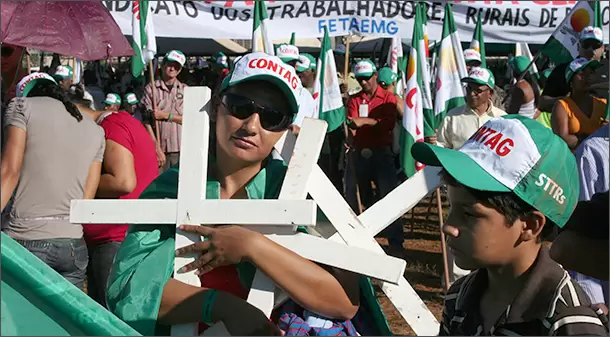CONTAG brings thousands of rural workers onto the streets of Brasilia to demand their rights
Thousands of rural workers massed in the streets of Brasilia on March 20 as part of a national mobilization by CONTAG to highlight the rights of rural wage earners and the urgent need for government action.
Brazil’s CONTAG is the world’s largest agricultural union, bringing together 27 member federations made up of some 4000 unions of wage earners and family farmers. While CONTAG’s regular Grito da Terra (‘Cry of the Earth’) mobilizes the union’s membership of workers and small farmers together around issues of policy for the sector as a whole, the March 20 action focused for the first time on the specific needs and demands of waged workers in the countryside.
 Of the 4.8 million waged agricultural workers in Brazil, only 1.6 million are covered (minimally) by employment and social security legislation. Brazil’s agricultural commodity boom has been built on a rural development model based on large land ownership and the intensive use of pesticides, genetically modified seeds, landgrabbing, expropriation and rural violence. Degrading working conditions and the exclusion of the majority of the waged work force from workplace and social security protection, according to CONTAG, mean that the enormous profits generated by Brazilian agriculture are built on the systematic denial of agricultural workers’ rights. The rapid pace of mechanization, particularly in sugarcane, has in recent years destroyed tens of thousands of jobs, with no alternative employment in the countryside on offer.
Of the 4.8 million waged agricultural workers in Brazil, only 1.6 million are covered (minimally) by employment and social security legislation. Brazil’s agricultural commodity boom has been built on a rural development model based on large land ownership and the intensive use of pesticides, genetically modified seeds, landgrabbing, expropriation and rural violence. Degrading working conditions and the exclusion of the majority of the waged work force from workplace and social security protection, according to CONTAG, mean that the enormous profits generated by Brazilian agriculture are built on the systematic denial of agricultural workers’ rights. The rapid pace of mechanization, particularly in sugarcane, has in recent years destroyed tens of thousands of jobs, with no alternative employment in the countryside on offer.

Antonio Lucas, CONTAG Secretary for rural workers, hailed the mobilization as a vital first step in building a specific platform for waged rural workers but sharply criticized the government’s non-committal response. “We cannot tell the workers that they are going to create a working group to study the situation and then consider possible actions”, said Lucas. “The government must understand that we are here for practical solutions.”
